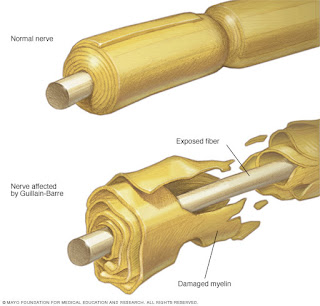Guillain–Barré syndrome, transverse myelitis and infectious diseases
Guillain–Barré syndrome (GBS) and transverse myelitis (TM) both represent immunologically mediated polyneuropathies of major clinical importance. Both are thought to have a genetic predisposition, but as of yet no specific genetic risk loci have been clearly defined. Both are considered autoimmune, but again the etiologies remain enigmatic. Both may be induced via molecular mimicry, particularly from infectious agents and vaccines, but clearly host factor and co-founding host responses will modulate disease susceptibility and natural history. GBS is an acute inflammatory immune-mediated polyradiculoneuropathy characterized by tingling, progressive weakness, autonomic dysfunction, and pain. Immune injury specifically takes place at the myelin sheath and related Schwann-cell components in acute inflammatory demyelinating polyneuropathy, whereas in acute motor axonal neuropathy membranes on the nerve axon (the axolemma) are the primary target for immune-related injury. Outbreaks of GBS have been reported, most frequently related to Campylobacter jejuni infection, however, other agents such as Zika Virus have been strongly associated. Patients with GBS related to infections frequently produce antibodies against human peripheral nerve gangliosides. In contrast, TM is an inflammatory disorder characterized
by acute or subacute motor, sensory, and autonomic spinal cord dysfunction. There is interruption of ascending and descending neuroanatomical pathways on the transverse plane of the spinal cord similar to GBS. It has been suggested to be triggered by infectious agents and molecular mimicry. In this review, we will focus on the putative role of infectious agents as triggering factors of GBS and TM.
REFERENCE:
Rodríguez Y, et al. Guillain-Barré syndrome, transverse myelitis and infectious diseases. Cell Mol Immunol. 2018 Jan 29. doi: 10.1038/cmi.2017.142. Review. PubMed PMID: 29375121.
by acute or subacute motor, sensory, and autonomic spinal cord dysfunction. There is interruption of ascending and descending neuroanatomical pathways on the transverse plane of the spinal cord similar to GBS. It has been suggested to be triggered by infectious agents and molecular mimicry. In this review, we will focus on the putative role of infectious agents as triggering factors of GBS and TM.
REFERENCE:
Rodríguez Y, et al. Guillain-Barré syndrome, transverse myelitis and infectious diseases. Cell Mol Immunol. 2018 Jan 29. doi: 10.1038/cmi.2017.142. Review. PubMed PMID: 29375121.



Comentarios
Publicar un comentario